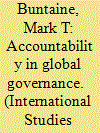| Srl | Item |
| 1 |
ID:
138302


|
|
|
|
|
| Summary/Abstract |
International organizations frequently lack accountability to both states and civil society groups. States often face difficulties monitoring the actions of international organizations. Civil society groups do not often enjoy direct influence over decision-making within international organizations. To address these challenges, states have created accountability mechanisms for international organizations. Accountability mechanisms allow civil society groups to submit complaints about the performance of international organizations. They take the form of ombudsmen offices, accountability panels, and complaint procedures. Little is known about when and why these mechanisms constrain behavior by international organizations that runs counter to the mutual interests of states and civil society groups. Using the World Bank Inspection Panel as a test case, I show that monitoring by civil society groups alters lending at the World Bank when it enhances oversight by powerful states. By combining their abilities in sanctioning and monitoring, states and civil society groups can promote accountability at international organizations.
|
|
|
|
|
|
|
|
|
|
|
|
|
|
|
|
| 2 |
ID:
155502


|
|
|
|
|
| Summary/Abstract |
We explain why international development organizations have had so little success building and reforming public sector institutions in developing countries. They often fail despite their apparently strong commitment to achieving measurable results and extraordinary amounts of time, money, and effort. We demonstrate that, when donors and lenders make access to financing contingent upon achievement of performance targets, recipient countries tend to choose easy and shallow institutional targets. These targets measure the organization of public sector institutions, rather than their effectiveness at addressing public problems. Such targets provide countries with low-cost opportunities to signal commitment to institution-building to international development organizations. We demonstrate the explanatory and predictive power of our argument in the context of a sector of World Bank lending—environment and natural resource management—that focuses heavily on improving public sector institutions.
|
|
|
|
|
|
|
|
|
|
|
|
|
|
|
|